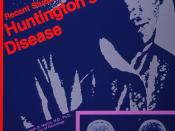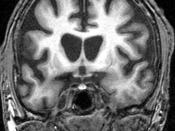Old essay, lots o' content, just needs a good proofread -
HUNTINGTON'S DISEASE
Huntington's disease, also known as Huntington's chorea is a genetic
disorder that usually shows up in someone in their thirties and forties,
destroys the mind and body and leads to insanity and death within ten to
twenty years. The disease works by degenerating the ganglia (a pair of nerve
clusters deep in the brain that controls movement, thought, perception, and
memory) and cortex by using energy incorrectly. The brain will starve the
neurons (brain cells), and sometimes make them work harder than usual,
causing extreme mental stress. The result is jerky, random, uncontrollable,
rapid movement such as grimacing of the face, flailing of arms and legs, and
other such movement. This is known as chorea.
Huntington's chorea is hereditary and is caused by a recently discovered
abnormal gene, IT15. IT stands for 'interesting transcript' because of the
fact that researchers have no idea what the gene does in the body.
Huntington's disease is an inherited mutation that produces extra copies of
a gene sequence (IT15) on the short arm of chromosome 4. A genetic base that
exists in triplicate, CAG for short, is effected by Huntington's disease. In
normal people, the gene has eleven to thirty-four of these, but, in a victim
of Huntington's disease the gene exists from anywhere between thirty-five to
one-hundred or more. The gene for the disease is dominant, giving children
of victims of Huntington's disease a 50% chance of obtaining the disease.
Several other symptoms of the disease exist other than chorea. High levels
of lactic acid have been detected in patients of Huntington's disease as a
bi-product of the brain cells working too hard. Also, up to six times above
the normal level of an important brain brain protein, bFGF (or...



Good essay.
Focus less on the conditions of others and more on the content.
1 out of 1 people found this comment useful.